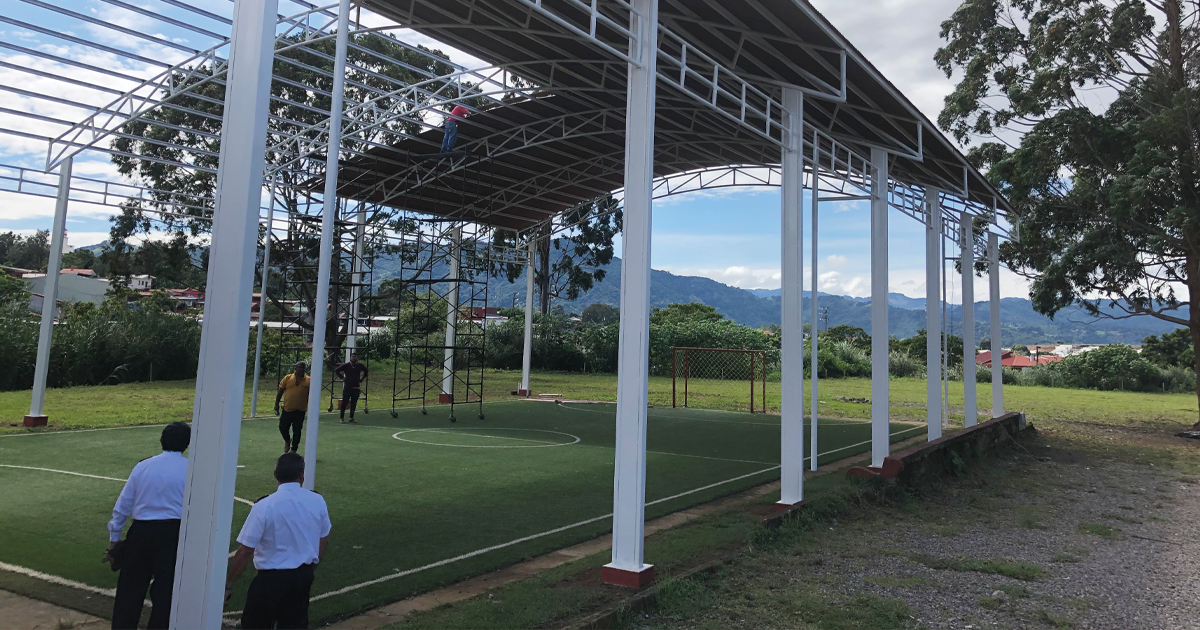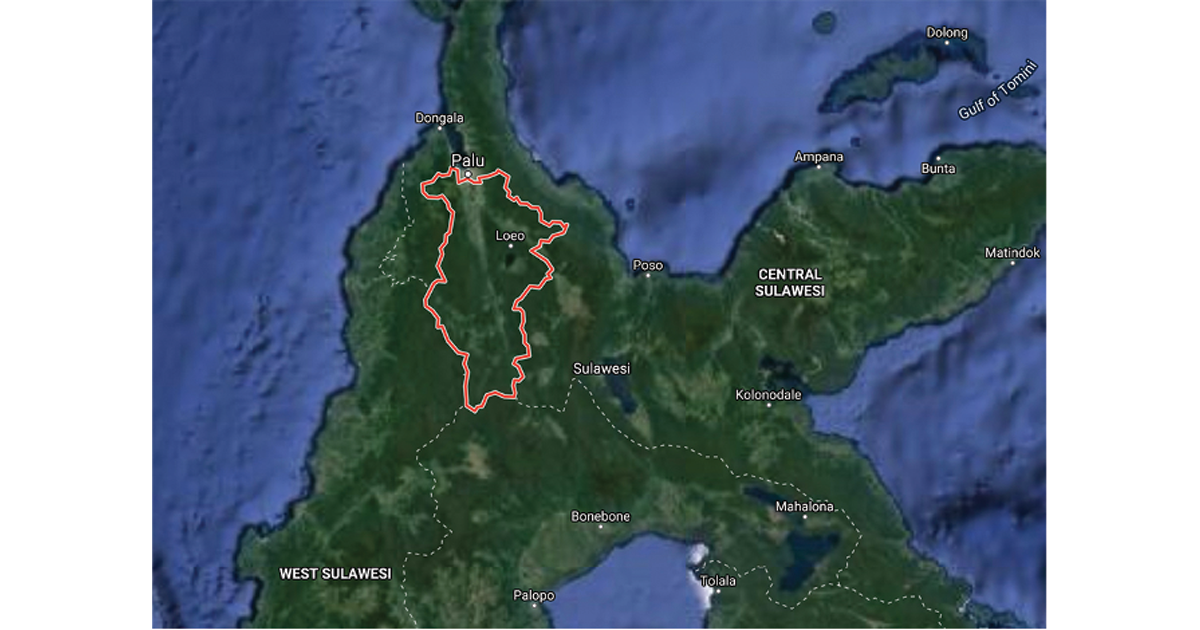Frontlines: January 2021
The Army's ministry spans 131 countries worldwide. Here's a look at how the Army is doing the most good around the globe.
Costa Rica’s Football Field of Dreams
Some community members still remember the frustration they felt many years ago when The Salvation Army moved into their neighborhood of Concepción just outside San José, the capital city of Costa Rica. There was an empty field near the middle of town where friends would regularly go to play football, until one day they showed up and found a fence encircling the property with signs that The Salvation Army had bought the land to create a new corps and men’s rehabilitation center. In a hilly region with few level areas, their main location for neighborhood games and community had come to an end.
Community members soon learned of the good work being done to help local men battle alcohol and drug addictions through their residential program, and of the spiritual and practical help that was offered through the Centro Modelo Corps Center, also on the property. Many joined the corps and several from the neighborhood even became officers.
Decades later, with the rehabilitation center scheduled to wrap up operations, local Salvation Army leaders sensed an opportunity to repurpose a beautiful location and to reestablish the neighborhood activity that had been accidentally displaced in the first place: a new community football field.
Once installed, the Concepción football field quickly became a favorite location for the community, offering a top-level turf for hourly or daily rental. However, they still faced the constraint of Costa Rica’s rainy season, which brings steady drizzle after noon almost every day for half the year. The territory reached out to the Salvation Army World Service Office (SAWSO) and its Capacity-Building Partnership Initiative (CBPI).
The CBPI is a new sector area within SAWSO that empowers international Salvation Army territories to achieve financial sustainability and establish innovative projects that support the local mission and programs. Together they create comprehensive territorial strategies for local resource generation and provide funding to test a variety of ideas. The ultimate goal is to develop their own capacity to innovate to meet local needs. It is a new way of thinking and operating that complements and supports the work of the Army around the world.
Together, the Latin America North Territory and the CBPI explored the potential community and financial benefit of further investment in the football field. They conducted market research and testing on current and potential customers, primary competitors and pricing structures. The result was to verify and create a social enterprise business model that would offer a valuable service at affordable prices, year-round.
With funding from SAWSO for a new roof for the field, the facility now serves as a prime location for the community to meet and engage with The Salvation Army on a daily basis. In addition, it is a beautiful activity space for the Army’s summer camps and is a steady source of local income support for the Army’s social programs.
SAWSO’s CBPI is now working with the territory to expand the enterprise and services by adding a snack shop, grill area, separate bathrooms and locker rooms and even a second field. Using CBPI methodology and business tools, the Latin America North Territory will evaluate each concept based on its community and financial impact and create a long-term strategy for sustainable service.
Damon Winters of SAWSO is the technical advisor for international business and economic development for SAWSO. He attends the Alexandria, VA Citadel Corps.
A Time For Peace

In November, an attack on a Salvation Army outpost in Lewono Lembantongoa, a rural village in Northern Indonesia, resulted in the death of four Salvation Army members. General Brian Peddle’s immediate reaction was to call on Salvationists and all concerned to pray for peace in that country. The attackers burned down the Army’s building and the six homes of the outpost’s members.
“Our hearts go out to our people who have been victims of evil, and to the families of those whose faith have caused such harm,” the General responded. “I call upon all Salvationists to pray for each person who has been affected, for the continuing witness of our people and for healing in the communities. I ask our global community to join us in this prayer, and believe that as peace finds its place, evil will be defeated… Throughout all aspects of Salvation Army ministry and influence we work for peace. As General, I assure our people in Indonesia of our deep love and prayers.”
Divisional Commander Erik Cape and fellow officers coordinated with police and with government officials of the Sigi Regency and Central Sulawesi Province, who provided protection for the villages in the area as the investigation was underway.
In a press statement released across Indonesia, The Salvation Army invited all churches and religious associations—along with community members—to support each other vigilantly.
Colonel Yusak Tampai, territorial commander for Indonesia, urged Salvationists in the region to “remain calm but alert and careful, spreading a strong message of hope and uniting in prayer to strengthen each other.”
The Army’s presence in Indonesia is another example of its mission to serve humanity where need is greatest without discrimination. Indonesia is the fourth largest country in the world in terms of population (about 261.5 million) and is the world’s largest island nation. Indonesia is the world’s most populous Islamic nation; a majority are Sunnis. The International Christian Concern commented that “Such senseless acts cannot be tolerated in a country that practices ‘Pancasilsa,’” the state’s commitment to promoting religious harmony and tolerance.
The Salvation Army in Indonesia has 60,000 members. It operates corps, clinics, social service centers, hospitals, kindergartens, primary schools, secondary schools, high schools, technical high schools and a theological university.
The General noted that The Salvation Army serves in 131 countries and that “the world continues to convulse with disturbing levels of violence affecting many of its people.”
The challenge for our world is to overcome sectarian, social, political and ethnic divisions with a better understanding of all human life as created by God and dear to him.
The Army in Central America Responds After Hurricane Eta
In November, Hurricane Eta caused flooding, landslides and severe damage to property to several countries in Central America. In Nicaragua, Salvation Army personnel described a “panorama of destruction” in the north. Neighborhoods in Honduras, El Salvador and Costa Rica also suffered serious damage.
The Army’s immediate response in Puerto Cabezas included delivering emergency food, water and hygiene packages as well as foam mats and bedding for individuals and families forced from their homes.
Emergency supplies were distributed using 4×4 vehicles in neighboring Honduras, in communities in Olancho, Danlí, Cortés, Atlántida, Choluteca, Tegucigalpa and San Pedro Sula.
Plans were drawn up to ensure access to nutrition for an initial two-month period for 900 of the most vulnerable people in El Salvador and Costa Rica. The Army coordinated with other service providers to ensure access to emergency accommodations and for those most in need.
Relief efforts were complicated by the need for social distancing and disease control measures to prevent the spread of the coronavirus. Speaking from San José, Costa Rica, Lt. Colonel Agripina Góchez, chief secretary, said: “We really appreciate the continuous support of the global Salvation Army during this unexpected natural disaster. Many people affected by this recent hurricane were already impacted directly or indirectly by COVID-19.”
Renewed Focus on Root Causes of Homelessness
According to a recent report by the U.S. Interagency Council on Homelessness, street level homelessness rose by 20.5% after a 3% decline from 2007 to 2014. Council executive director Dr. Robert Marbut, Jr. notes that the rate of homelessness persists and has increased despite the “housing first” initiative over the past five years. The purpose of the initiative was to provide housing as a foundation from which those experiencing homelessness could provide for themselves and their families, seek employment and find stability.
“The housing first permanent program has not impacted those in shelters. Street level and sheltered homelessness has increased because of move away from treatment and recovery,” Dr. Marbut told a gathering of Salvation Army social service personnel in November. “Despite doubling the funding for permanent housing and tripling it for transitional housing, still shelter and street homelessness has risen.”
Dr. Marbut told the group that he had visited 150 Salvation Army locations in the fall. “What the Army is doing is amazing. Congratulations on your ability to ramp up in most trying of times.” He noted that it is time to get back to the model of intervention that the Army employs successfully. “We used to address the
root causes. We need to get back to that— substance abuse, post traumatic stress, mental health…we need to move to a trauma informed approach to prevention by approaching it as a personal, spiritual, social, economic issue. That is what helps people to move past the condition of homelessness to self-sufficiency. Everyone has a personal story of how they ended up where they are.”
This approach is the foundation of the new strategic plan released by the Interagency Council on Homelessness released in October. Entitled “Expanding the Toolbox: Expanding the whole-of- government response to homelessness,” it “presents a strategic view for implementing a compassionate and outcomes-driven response to our nation’s homelessness crisis.”
Trends identified by the council that exacerbate the problem of homelessness include human sex and labor trafficking. Research indicates that in most cases adult homelessness has its roots in homelessness experienced in younger years. Another concerning trend is that the number of children and youth experiencing homelessness continues to rise. Approximately 1,400,000 experienced homeless (grades PreK to 12) over 2016-17 as identified by the Department of Education.
Pathway of Hope to Offer Career Placement
The Pathway of Hope is the Army’s initiative to break the cycle of intergenerational poverty by intervening in practical ways to help individuals and families find stability, meet basic needs and move toward self-sufficiency. The Salvation Army has formed a partnership with InsightGlobal University to assist Pathway of Hope participants in finding employment. Insight Global University is a staffing and talent solution firm with 58 offices across North America. They have helped over 3,000 clients find the right people for their businesses, and average about 40,000 placements annually. Their core value is “We Take Care of Each Other.” The firm will work with the Pathway of Hope to roll out services to the community such as:
- Workshops for Participants: (Stage 1) Mindset and Motivation; Resume Building, Interview Tips; Linkedin Branding; (Stage 2) Career Growth; Time Management; Performance Review Preparation.
- Case Manager Workshops: Mentorship, Leadership and Motivation.
- Recruiting Services: Access to portal so participants can submit a resume and connect with an Insight regional recruiter.
COVID-19 Relief Efforts
The Salvation Army has mobilized in innovative ways both nationally and internationally to extend essential services to those most affected, from healthcare workers to those who have lost jobs or have suffered loss. The challenge over the Thanksgiving and Christmas seasons was to maintain the level of service and support the Army normally engages in while continuing its response to the pandemic. Even before Thanksgiving, key relief efforts nationally included:
- Distribution of about 4,267,000 food boxes, with each box containing 20 meals.
- Providing 1,643,555 nights of shelter.
- Offering 865,157 individuals emotional and spiritual care.
- Preparing about 15,173,000 meals.
The generous response to #RescueChristmas has helped the Army offer assistance during the holidays. Funds help support efforts at the local level throughout the year. To see how to pitch in, visit salvationarmyusa.org.







